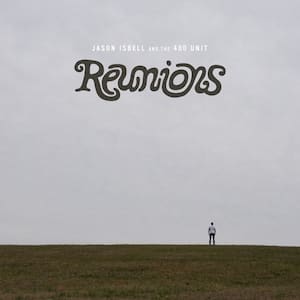 Jason Isbell and the 400 Unit – Reunions
Jason Isbell and the 400 Unit – Reunions
Thirty Tigers – 15 May 2020
Jason Isbell’s fourth album with his current band the 400 Unit (and seventh overall), along with David Crosby singing backups, continues his high-quality standard on a collection of songs that look both inward and at the world around him.
The longest track and the first single, What Have I Done To Help? is a vocally echoing, strings and keys-backed sinewy blues-shaded rock number about feeling a sort of survivor guilt when you and those close to you are doing fine when others are having a hard time and weighing how you could have reached out a hand instead of becoming complicit in the suffering. It surely has an even greater resonance now.
It’s followed by one of the first standouts, and indeed, one of his finest songs to date, Dreamsicle, a subdued piano and acoustic strum in which he’s a 14-year-old kid confronting the implosion of his family and having to move town and leave his friends again (“but they’ll just find another face to fall behind and take my place”). At one moment he’s remembering the taste of ice cream on a summer night and the next recalling “Poison oak and poison ivy/ Dirty jokes that blew right by me/Mama curling up beside me, crying to herself” and yet asking “Why can’t daddy just come home?/Forget whatever he did wrong/He’s in a hotel all alone, and we need help”, again contemplating escape from the living ghosts in his life.
Keeping the volume and pace down, Only Children is a spare, fingerpicked reflection on childhood days and of a friend who’s passed, a fellow aspiring songwriter, who, unlike him, never escaped their small town, recalling how “Heaven’s wasted on the dead/That’s what your mama said/ And the hearse was idling in the parking lot”.
It’s back then to chiming electric guitars and walking drum beat with Overseas as, continuing the train of thought into a theme of separation, he opens with “This used to be a ghost town, but even the ghosts got out”, voice soaring as he sings “you’re never coming back to me” before Sadler Varden lets rip a solo, the track and its tumbling chords channelling the spirit of Tom Petty.
Riding a simple, loose-limbed Knopfleresque bluesy riff, percussive click and subtly Manzarak-like keyboard shades before the guitars again gather force, Running With Our Eyes Closed is the only number that feels like a filler, a chance for the band to stretch out in a live setting before building the energy back up. The level resets, however, with the terrific River which, featuring wife Amanda Shires on fiddle, strikes a dusty southern country mood on a song about salvation and finding grace in what gradually reveals itself to be a murder ballad with the water washing away the blood on the knife and the secrets of the “things I cannot tell a soul/ Like the children that I’ve orphaned, and the fortune that I stole”.
Moodier and spare, the stripped-back St Peter’s Autograph was written for Shires as she was grieving the loss of her close friend, singer-songwriter Neal Casal, to suicide as he asks “has your faith been compromised?” and “what do I do to make you smile… what can I do to help you sleep?” Going on to admit “I can’t comprehend your pain”, he removes any thoughts of jealousy at the depths of her feelings of loss in the profoundly moving line “what do I do to let you know I’m not haunted by his ghost, let him dance around the room let him smell like your perfume”.
Understandably, despite indictment of political apathy, the musically upbeat, ringing guitar Be Afraid has a hard time following this, which is why, perhaps, the album ends with two slams to the heart. First comes It Gets Easier, a midtempo, pedal steel stained Southern country-rock about staying sober (“it gets easier, but it never gets easy”), of driving past a local bar and hoping a cop would pull him over to keep him from going in, and of understanding that, while he stays away from the drink, he can’t expect his wife to have too as well.
It ends on another family note with the plaintive acoustic honky-tonk waltzing strum of Letting You Go, a musical homage to his idol the late John Prine, and the song of a father to his daughter, following the journey from taking her home from hospital, to wrestling with the intricacies of the baby car seat to the moment when he has to give her away to another man as she embarks on her own path in life. Given his daughter’s still only four, that won’t be for a while, but when he sings “Being your daddy comes natural/ The roses just know how to grow/It’s easy to see that you’ll get where you’re going, but the hard part is letting you go” it would take a stronger man than most not to feel a lump in the throat and a tear in the eye.
Isbell has said that the album is about ghosts, of others, of his past self and both he and Shires have spoken about how the pressure in making it, in living up to its predecessors, rattled his self-security and put a strain on the marriage and the recording process (at one point she moved out into a hotel). At the end of the day, while it may have been a troubled journey, as the title implies, these are about coming together rather than moving apart. Embrace it in both arms like an old friend, this is no time for musical social distancing.
Photo credit: Alysse Gafkjen

